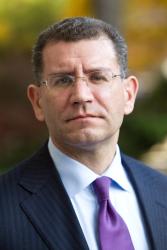

12:30 pm EST - 2:00 pm EST
Past Event
12:30 pm - 2:00 pm EST
1775 Massachusetts Ave., NW
Washington, DC
The Saban Center for Middle East Policy at Brookings hosted a policy luncheon on November 12, 2007 with Daniel L. Byman, Saban Center Senior Fellow and Professor at Georgetown University, and Richard Clarke, Chairman of Good Harbor Consulting and former Chief Counterterrorism Advisor on the National Security Council during the Clinton administration. Kenneth M. Pollack, Director of Research of the Saban Center, chaired the discussion.
Daniel Byman presented his new book, The Five Front War: The Better Way to Fight Global Jihad. He talked about the nature of the global jihadist threat by assessing its strengths and weaknesses. Byman proposed six ways to combat jihadist terrorism. Richard Clarke provided comments on how to think originally about this new terrorist threat and offered recommendations for the U.S. government on counterterrorism strategy.
Byman began by stating that the purpose of his book is to write about today’s counterterrorism challenge in a more comprehensive manner, looking at the available strategic options and instruments and assessing their advantages and disadvantages.
Byman singled out al-Qa‘ida as the world’s main terrorism adversary. Al-Qa‘ida is an organization that is affiliated with different Islamist groups around the world, in particular those engaged in insurgencies. When analyzing insurgencies in the Muslim world, al-Qa‘ida appears to be either fully involved, or participating (as has occurred in Iraq). For Byman, ideology is an important matter to be borne in mind when analyzing al-Qa‘ida, specifically the organization’s efforts to promulgate a specific interpretation of Islam, and to encourage Muslims, and in particular young men, to subscribe its beliefs.
According to Byman, two factors have changed significantly for al-Qa‘ida since 9/11. The first is Iraq. In 2003, the organization was under much criticism from the broader jihadist community for attacking the United States, especially as its operatives were being captured. The Iraq War, Byman argued, helped resuscitate al-Qa‘ida, making it the “poster child” of recruitment for the global jihadist cause. The second factor is Pakistan, which became al-Qa‘ida’s a safe haven after the loss of Afghanistan.
Next, Byman maintained that in addition to its strengths, al-Qa‘ida has many weaknesses. He listed five: the first is factionalism; the second is al-Qa‘ida’s negative attitude towards the broader political Islamist movement as partly represented by the Muslim Brotherhood; the third is the distinction between the violent jihadist movement and the broader and often non-violent and apolitical Salafi movement; the fourth is internal al-Qa‘ida divisions along national lines; fifth, and finally, is the question of takfir (declaring other Muslims to be infidels) as opposed to fostering unity within Islam.
Byman said that the United States could exploit these potential weaknesses with a six dimensional approach: intelligence, military, diplomatic, homeland security, ideas, and political reform. Byman believes that the United States should be thinking along all of these lines.
Clarke commented that the Islamist extremist threat, in slight disagreement with Byman, should not be viewed as a single phenomenon. There are six distinct fronts which require geographically distinct solutions. The biggest problem, Clarke asserted, is the combined Afghanistan-Pakistan issue, where al-Qa‘ida is currently residing and planning attacks against the United States. While we may have a strategy on the Afghan side, Clarke warned, we remain vulnerable on the Pakistan side. The second front is Iraq, which Clarke claimed requires a different solution. The European theater is the third front and the Persian Gulf, the Maghreb, and Southeast Asia are the fourth, fifth and sixth fronts respectively.
After briefly talking about each front and respective solution required in each, Clarke addressed the issue of a potential terrorist attack against the U.S. homeland. Clarke argued that a terrorist attack in the United States should not fundamentally alter the country or seriously damage the economy unless it was a nuclear attack. A nuclear weapons incident or a significant radiological attack would, according to Clarke, change the American way of life and government. Clarke ended on a somewhat grim note by stressing that, in agreement with Byman, the political atmosphere in Washington prevents a nonpartisan and productive discussion on and approach to tackling and combating the threat of violent global jihad.



Landry Signé
May 27, 2025

Philip H. Gordon
May 16, 2025

Joshua T. White
May 14, 2025